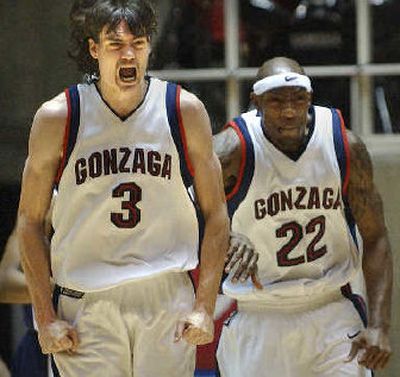Our Zags are living an odyssey of their own

In the sports pages Friday morning, I looked at Brian Plonka’s photo of Zags Adam Morrison and Erroll Knight, their faces wired with adrenaline, their arm muscles bulging, and said, “They look just like gladiators.”
My husband, a retired Gonzaga University English professor, corrected me. No, he said, they’re more like epic heroes. Think Achilles in “The Iliad,” he said. Achilles even trash talked, my husband informed me.
The conversation helped me understand why some women who go gaga over the Zags can’t stand to watch football or hockey. Basketball, of all the sports, harkens to epic stories, stories as old as Homer, who is thought to have written “The Iliad” and the “The Odyssey” sometime between 800 and 700 B.C. That’s my cosmic spin. But the comparison starts in a shallow way. With uniforms.
For research purposes, I rented the movie “Troy,” starring Brad Pitt, based, in part, on “The Iliad.” I watched it while leafing through my copy of “The Iliad,” purchased in 1976 for an English class taken during my Gonzaga-in-Florence year. The book smells of mildew, testament to the damp basements where I stored it during my many moves throughout my 20s. My notes fill the margins, penned in tidy handwriting I no longer possess.
In the movie, Achilles and his fellow warriors wear sleeveless light armor over short tunics. Their sandal-boots reach midcalf. I looked at those warriors, then looked at the Plonka photos of the Zags and noticed many sartorial similarities.
This decade, basketball shorts have grown baggier and longer; they now have a tunic sensibility. And the sleeveless shirts? They show off the exact muscle groupings as that light armor worn by the epic heroes, at least in the movie versions. And basketball players’ socks and shoes reach mid-calf, same as those ancient sandal-boots.
And what about that trash talk? Toward the end of “Troy,” Achilles, favored by the gods, approaches the walls of Troy. He desires to go mano a mano with Hector. He stands in the dirt and screams, “Hector!” He grows angrier and angrier, face swelling, breath rising.
In the scene, Brad Pitt’s eyes have that same slightly crazy look seen in the eyes of Adam Morrison when he’s venting his anger through trash talk.
Hector emerges from the gates of Troy. Achilles’ trash talk begins: “You won’t have eyes tonight! You won’t have ears or a tongue! You will wander the underworld blind, deaf and dumb, and all the dead will know: This is Hector, the fool who thought he killed Achilles!”
In the movie, Hector doesn’t trash talk back. But in the book, he does. He says, “Never hope by words to frighten me as if I were a baby. I know that you are great and that I am far weaker than you are. Weaker as I am, I might still strip the life from you.”
Despite his boasts, Hector ends up the same way most Morrison opponents do: out of the game. In the next scene, Achilles is dragging in the dirt a very dead Hector.
The Zags, like those epic heroes, are at the height of their physical powers. They possess gifts that seem, at times, bestowed from gods above. They are so young. We older ones know this time in their lives will pass quickly. They will fade into obscurity, into the routine of adult life with wives and children and careers, and when they are old men, late at night they may replay the games and remember the one week in the one season when an entire country stopped to watch them.
We older ones know all this, and still we stand in awe before them, the way the royalty of Troy stood high in the castle walls, entranced with the drama unfolding below between Achilles and Hector.
This is the epic reality, and epic fantasy, of Sweet 16 week. May we savor it as long as it lasts.